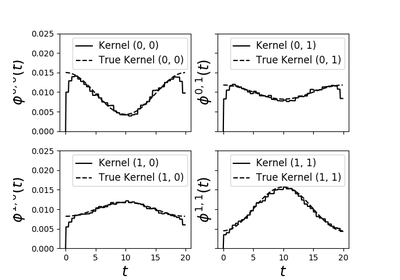tick.hawkes.HawkesBasisKernels¶
-
class
tick.hawkes.HawkesBasisKernels(kernel_support, n_basis=None, kernel_size=10, tol=1e-05, C=0.1, max_iter=100, verbose=False, print_every=10, record_every=10, n_threads=1, ode_max_iter=100, ode_tol=1e-05)[source]¶ This class is used for performing non parametric estimation of multi-dimensional Hawkes processes based on expectation maximization algorithm and the hypothesis that kernels are linear combinations of some basis kernels.
Hawkes processes are point processes defined by the intensity:
\[\forall i \in [1 \dots D], \quad \lambda_i = \mu_i + \sum_{j=1}^D \int \phi_{ij} dN_j\]where
\(D\) is the number of nodes
\(\mu_i\) are the baseline intensities
\(\phi_{ij}\) are the kernels
The basis kernel hypothesis translates to:
\[\phi_{ij}(t) = \sum_{u}^U a_{ij}^u g^u(t)\]where
\(U\) is the number of basis kernels.
\(g^u\) is a basis kernel
\(a_{ij}^u\) is the amplitude of basis kernel \(u\) in kernel \(\phi_{ij}\)
Finally we also suppose that basis kernels \(g^u\) are piecewise constant on a given support and number of intervals.
- Parameters
kernel_support :
floatThe support size common to all the kernels.
n_basis :
int, default=`None`Number of non parametric basis kernels to be used. If
Noneor 0, it will be set ton_nodeskernel_size :
int, default=10Number of discretizations of the kernel
C :
float, default=1e-1The penalization parameter. It penalizes both the amplitudes squared values and the basis kernels smoothness through the integral of their squared derivative.
tol :
float, default=1e-5The tolerance of the solver (iterations stop when the stopping criterion is below it). If not reached the solver does
max_iteriterationsmax_iter :
int, default=100Maximum number of iterations of the solver
verbose :
bool, default=FalseIf
True, we verbose things, otherwise the solver does not print anything (but records information in history anyway)print_every :
int, default=10Print history information when
n_iter(iteration number) is a multiple ofprint_everyrecord_every :
int, default=10Record history information when
n_iter(iteration number) is a multiple ofrecord_everyn_threads :
int, default=1Number of threads used for parallel computation.
if
int <= 0: the number of physical cores available on the CPUotherwise the desired number of threads
- Attributes
n_nodes :
intNumber of nodes of the estimated Hawkes process
n_realizations :
intNumber of given realizations`
baseline :
np.arrayshape=(n_nodes)The estimated baseline
amplitudes :
np.arrayshape=(n_nodes, n_nodes, n_basis)Amplitudes of all basis kernels for all kernels.
basis_kernels :
np.arrayshape=(n_basis, kernel_size)Estimated basis kernels
kernel_dt :
floatKernel discretization step. It is equal to
kernel_support/kernel_sizekernel_discretization :
np.ndarray, shape=(kernel_size + 1, )Kernel discretizations points, denotes the interval on which basis kernels are piecewise constant.
References
Zhou, K., Zha, H. and Song, L., 2013, June. Learning Triggering Kernels for Multi-dimensional Hawkes Processes. In ICML (3) (pp. 1301-1309).
Some rewriting notes for implementing the algorithm can be found in the doc/tex directory.
-
__init__(kernel_support, n_basis=None, kernel_size=10, tol=1e-05, C=0.1, max_iter=100, verbose=False, print_every=10, record_every=10, n_threads=1, ode_max_iter=100, ode_tol=1e-05)[source]¶ Initialize self. See help(type(self)) for accurate signature.
-
fit(events, end_times=None, baseline_start=None, amplitudes_start=None, basis_kernels_start=None)[source]¶ Fit the model according to the given training data.
- Parameters
events :
listoflistofnp.ndarrayList of Hawkes processes realizations. Each realization of the Hawkes process is a list of n_node for each component of the Hawkes. Namely
events[i][j]contains a one-dimensionalnumpy.arrayof the events’ timestamps of component j of realization i. If only one realization is given, it will be wrapped into a listend_times :
np.ndarrayorfloat, default = NoneList of end time of all hawkes processes that will be given to the model. If None, it will be set to each realization’s latest time. If only one realization is provided, then a float can be given.
baseline_start :
Noneornp.ndarray, shape=(n_nodes)Used to force start values for baseline attribute If
Nonestarts with uniform 1 valuesamplitudes_start :
Noneornp.ndarray, shape=(n_nodes,n_nodes,D)Used to force start values for amplitude parameter If
Nonestarts with random values uniformly sampled between 0.5 and 0.9basis_kernels_start :
Noneornp.darray, shape=(D,kernel_size)Used to force start values for the basis kernels If
Nonestarts with random values uniformly sampled between 0 and 0.1
-
get_history(key=None)¶ Returns history of the solver
- Parameters
key :
str, default=NoneIf
Noneall history is returned as adictIf
str, name of the history element to retrieve
- Returns
output :
listordictIf
keyis None orkeyis not in history then output is a dict containing history of all keysIf
keyis the name of an element in the history, output is alistcontaining the history of this element
-
get_kernel_values(i, j, abscissa_array)[source]¶ Computes value of the specified kernel on given time values. This makes our learner compliant with
tick.plot.plot_hawkes_kernelsAPI- Parameters
i :
intFirst index of the kernel
j :
intSecond index of the kernel
abscissa_array :
np.ndarray, shape=(n_points, )1d array containing all the times at which this kernel will computes it value
- Returns
output :
np.ndarray, shape=(n_points, )1d array containing the values of the specified kernels at the given times.
-
objective(coeffs, loss: float = None)[source]¶ Compute the objective minimized by the solver at
coeffs- Parameters
coeffs :
numpy.ndarray, shape=(n_coeffs,)The objective is computed at this point
loss :
float, default=`None`Gives the value of the loss if already known (allows to avoid its computation in some cases)
- Returns
output :
floatValue of the objective at given
coeffs
